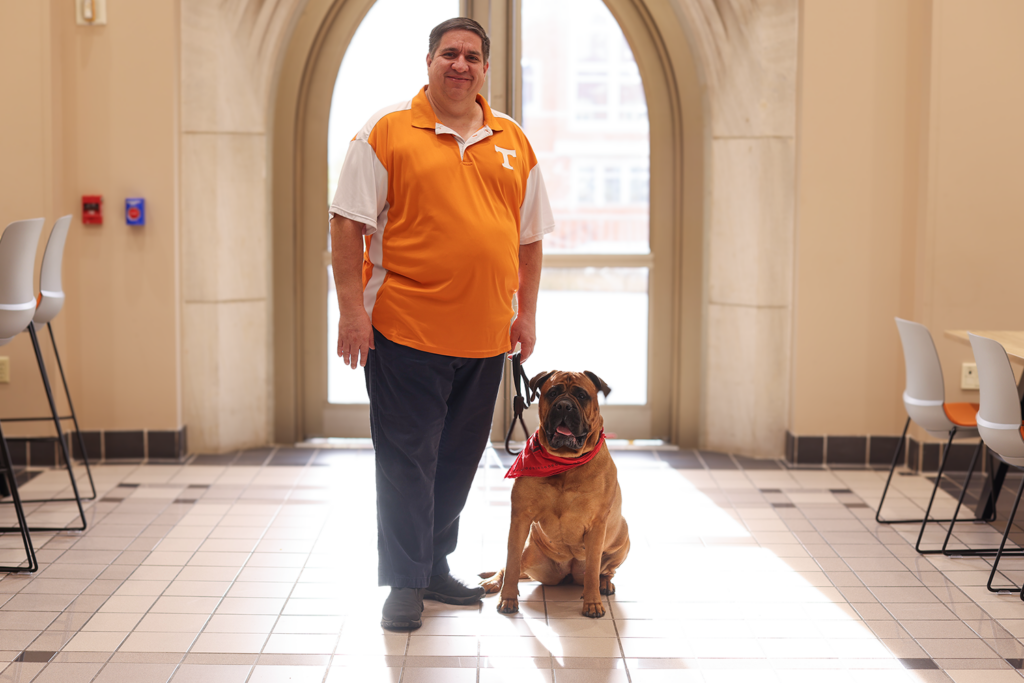When University of Tennessee College of Law students leave the Academic Success office feeling calmer than when they walked in, they often have Professor Harold Heck and his bullmastiff to thank.
Heck joined the faculty in the fall of 2024 as the associate director of the Academic Success Program, as well as a teaching assistant professor of legal writing. He made it his mission to be a positive player on the Tennessee Law team—to encourage students, faculty, and staff alike.
After serving in the Navy, earning an MBA, and working for a decade in corrections, Heck pursued a law career in part because of injustices he’d witnessed earlier in life.
“When I was younger, I saw a lot of employers taking advantage of employees in ways that I now know were probably illegal,” Heck says. “It seemed like they got away with it because people didn’t know or couldn’t afford to see an attorney.”
Earning a law degree was one of the ways that Heck became a resource for people in need, and he practiced law for two years in the areas of disability, veteran benefits, and bankruptcy.
As the first college graduate in his family, he also knew the challenges of getting a degree, and didn’t take his education for granted. Desiring to see other law students succeed as he did, Heck moved into academia and over eight years held several positions around the country as an academic success specialist. Then in 2024, he heard about an open position at Tennessee Law.
“I had many colleagues, including a Tennessee Law grad, who spoke so highly of the school, the area, and Charisse Heath, director of the Academic Success Program,” Heck says. “The position was unique in that it gave me an opportunity to continue to work in academic success and teach legal writing as well.”
Beside Heck’s teaching and advising roles, many Tennessee Law students have come to know him through Rose, his bullmastiff. Heck and Rose became a Certified Therapy Dog Team in 2022, and have volunteered hundreds of times since then. He emphasizes that therapy dogs are well trained, and are distinct from both service and emotional support animals. While those types of animals are there for the owner, therapy animals are there to benefit other people.
Heck chose law school as one of the primary places (including hospitals) where he uses Rose. He understands that students entering the Academic Success office may feel stigmatized, thinking that others will see them and know they’re struggling academically.
“Although many students visit me or Professor Heath voluntarily, some are required to because their grades have fallen into that danger zone,” Heck says. “Having the dog there is an easy way out, because if someone sees them coming out of my office and assumes they’re struggling, they can say, ‘No, I was here to see Rose,’ because everybody loves Rose.”
Studies have shown that spending even ten minutes with a therapy dog can help significantly reduce the amount of the stress hormone cortisol in a person’s body. This is why Heck brings Rose to the testing center during bar exams, particularly after the morning session when many students are experiencing anxiety and self-doubt.
“You can’t go back and change your answers, so you’re worried about something you can no longer control,” Heck says. “But worry and stress can negatively affect what you can control, which is the afternoon session. So if students come out and sit with Rose for several minutes, they will go into the next session less stressed, which should help their performance.”
Heck says that all the good things he heard about Tennessee Law prior to coming here have proven true. He’s pleased to be part of a team that is dedicated to helping law students succeed and become forces for good in the world.
“Everybody here views each other as equals, and we’re all working together to reach that common goal,” Heck says. “The teamwork and the camaraderie are amazing here.”
